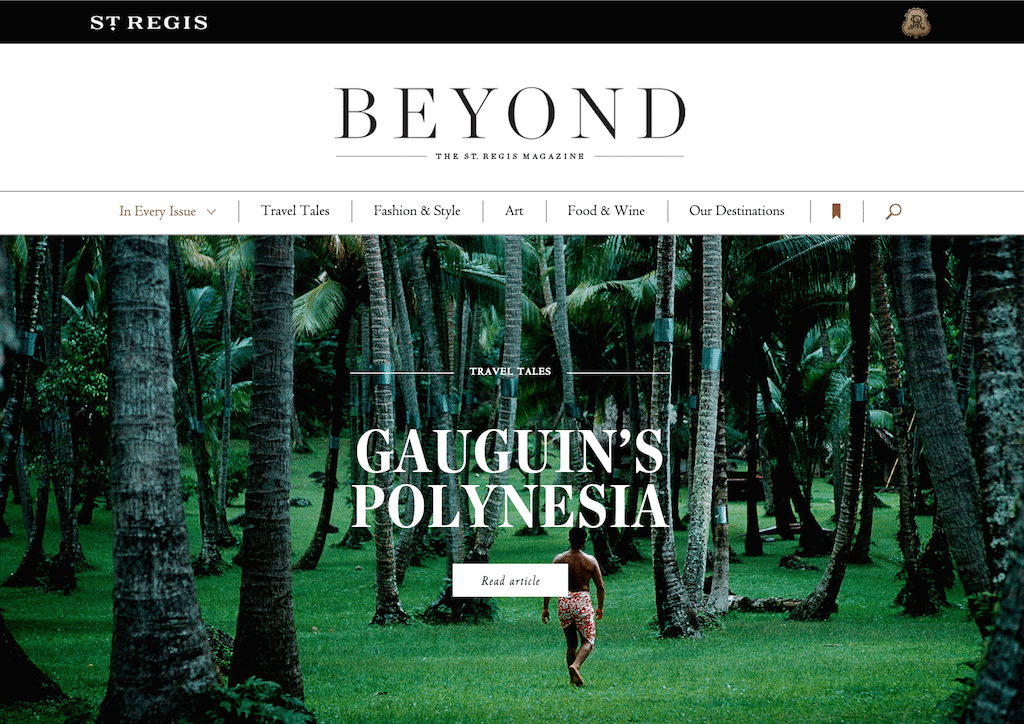Skift Take
The newest entry into the hospitality travel content space is the most nuanced yet with an old school appreciation for literary finesse, subtle tone, and no cute kids.
The very top end of the hospitality food chain has led the push toward respectable online travel content on hotel websites, but typically it’s mostly casual short form writing designed to be highly shareable with an emphasis on punchy photos.
St. Regis Hotels quietly launched its new online Beyond platform last month, expanding on its in-room publication of the same name. While the new portal has its fair share of snackable blurbs, there’s also a surprisingly varied selection of reposted feature print stories in full length, which runs counter to normal thinking for online destination travel content.
The Brave New World publishing house in London is responsible for the editorial direction and delivery.
For example, the Gauguins’ Polynesia story runs over 2,000 words, supported with modern photography shot in a style that emulates the master painter’s palette and promotes the scenery at The St. Regis Bora Bora Resort. The story was written by Nigel Tisdall, who won the British Guild of Travel Writers top scribe award in 2011.
The Gauguin piece is emblematic of the overall tone throughout Beyond aimed at a travel customer interested in art, fashion and food. This is not unusual among the luxury set of course, but it’s a little more nuanced, more New Yorker than Forbes.
In American Beauty (1,831 words), about New York society gal Babe Paley, who ruled the roost at The St. Regis New York back in the day, author David Masello writes:
Throughout her decades-long tenure as a society leader, the embodiment of high fashion, and a fundraiser for her favorite charities, Babe also occupied a role that could only have existed in her day. Certainly to fashionable women in New York, but also to those in the far reaches of America, Babe Paley was a recognized name, the exemplar of style and grace. Such was her power that one warm day, upon leaving a Manhattan restaurant, she removed her scarf and tied it to her purse. Paparazzi recorded the moment and “in no time, women throughout America were tying scarves to their handbags,” recalls [biographer David] Grafton. “So great was Babe Paley’s charisma that women of all ages and from every walk of life would do nearly anything to emulate her. They wanted not only to look like her but to be like her.
That speaks to the aspirational ideal of the St. Regis customer, and it’s not like most any other content that you’ll find on a hotel website today.
In the editorial department section, there are a couple of interesting recurring sections that group shorter stories together.
A Life in Seven Journies encapsulates the life of famous people, such as Jane Goodall and P.J. O’Rourke, via seven character-building trips described by the subject person. From a casual glance, none of the content seems to intimate any connection to any of the St. Regis properties.
In this post about Scottish photographer Harry Benson, he discusses his time covering the Meredith march in Mississippi in 1966:
The Civil Rights Movement was at its height when I drove to Tuscaloosa, Alabama, HQ of the Klu Klux Klan. I knew this was going to be dangerous, but it was my job. I met the grand wizard, Bobby Shelton, and attended Klan meetings with him. I followed the whole march; I went to rallies, I was tear-gassed, saw beatings, hid film in my socks. When I met Martin Luther King, I said to him, “This is just awful.” And he said, “It is awful being a black man in this country.” Jobs like these were journeys into the heart of America.
The World in Seven Objects is a curious bit of travel content storytelling highlighting various objects with no discernible common connection other than the fact that wealthy people covet them for cocktail party conversation starters. Sample posts include the rise in vintage motorcycle auction prices and the rise of interest in collectible retro postcards.
A Little Place I Know is full of examples of those small secreted joints that only locals know about, like the perfect 18th century wine shop in London where Lord Byron once purchased his favorite pinots.
Also surprising, there’s nothing in Beyond related to kids. There are no photos of cute kids eating ice cream without making a mess of their face, or cute teenagers laughing wholeheartedly at their cute parents’ jokes. No fishing, canoeing or horseback riding photos. For older and well-educated travelers without kids, the lack of family drama is refreshing.
There’s a place for that, but this isn’t that place.
Have a confidential tip for Skift? Get in touch
Tags: content marketing, st. regis, starwood
Photo credit: Homepage of St. Regis Hotels' new digital travel magazine, 'Beyond.' St. Regis Hotels
